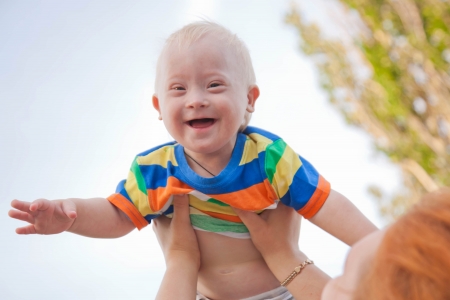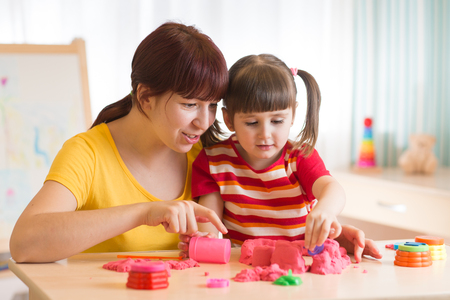After you tide over the initial few weeks of motherhood, when your baby eats and sleeps for most part of the day, you will enter the phase of child developmental milestones. The first milestone you will notice is the social smile, followed by head holding, rolling over, and turning the head and so on. In the midst of these milestones, you may at some point of time be concerned whether your baby is developing normally or not. Child development delay, basically means the delay in achieving these milestones. Each of these milestones that you read about has ranges that span over a few months. Each child is unique and he achieves these milestones at his own pace so few weeks here or there is considered perfectly normal. Example if your baby starts walking a few months after his first birthday, it is considered as normal as the baby who begins at 11 months.
What Are Developmental Milestones?
The term developmental delay is used by doctors to denote a delay in achieving the standard milestones. However it does not signify an abnormality as the problem could be in any one of the areas like-
- Gross motor skills – Turning, sitting, crawling etc
- Fine motor skills – Holding and turning objects in the hands
- Social skills – Playing and interacting with other kids.
- Self help skills – Dressing up, wearing shoes and toilet training
- Communication skills – Understanding languages and speaking them.
The way each baby achieves the milestones is not fixed. One 8 month old may be fast in developing gross motor skills but poor at social interactions. Another may be socially active and playful but may have delayed sitting and crawling. Any such case is to be considered normal as long as the child is making progress in each area of development.

Types of Child Development Delay
- Global Developmental Delay : In early months, if you notice that your baby is quite and disinterested in the surroundings, then it may raise an alarm in your mind. If all the areas of development are slow then this type of child development delay is termed as a global developmental delay. The commonest causes for this are:
- Down’s syndrome
- Fragile X syndrome which is a cognitive disorder
- Premature babies with lot of medical complications
- Fetal alcohol syndrome
- Other genetic disorders.
- Language and Speech Developmental Delay : Delayed speech and language is the commonest type of child development delay seen in children. Speech is basically the expression in the form of words and language is structured speech. The common reasons behind this type of delay are-
- Learning disability
- Too many languages being spoken at the same time due to which the child picks up only pieces of each.
- Neglected child
- Dysarthria- a medical condition where there is a problem with the muscles that regulate proper speech articulation
- Autism- Autism spectrum disorder is a neurological condition where the child has poor social skills, impaired cognitive skills and delayed communication.
- Hearing loss or problems with the middle ear or inner ear can lead to delayed talking or speech problems as the child is not exposed to words and their sounds. If a child doesn’t speak at all by the age of one, then hearing should be tested.
Red Flags of Delayed Communication:
- By the age of 4 months, if your baby
- Does not respond to loud noises or does not get startled in response to a loud sound.
- Does not babble
- Cannot make any sounds at all
- By the age of 7 months, if your baby does not respond to his name or a loud sound.
- By the age of one year, if your baby does not speak monosyllables or words like mama, baba etc.
- Two year old speech delay is when your child,
- Does not use at least 15 words in his talking throughout the day
- Does not talk in words to communicate what he needs. Example water or the need to use the washroom are not told in words but only shown in actions, then it is a sign to be taken seriously.
- Does not make two or three phrase sentences.
- Only talks by repeating what he hears. No new words spoken.
- Vision Developmental Delay : The vision of a newborn is very restricted but as the child grows, the scope of vision and the clarity tend to increase. The common cause of vision delays in children are:
- Nearsightedness or Farsightedness
- Infant cataracts
- Retinopathy
- Strabismus
The commonest way to recognize that your child has a vision problem is to hold your finger between both the eyes and slowly move it, if your baby does not follow your finger or any other moving object by the age of 3 months then you should get him checked. Other alarming symptoms could be watering from the eyes, inability to focus and the eyes may seem to cross all the time.
- Motor Skills Delay : This type of child development delay could involve gross motor skills like crawling, sitting, rolling etc or fine motor skills like griping an object with the hands, holding a toy and turning it around etc. The common causes of motor skill delay are:
- Cerebral palsy- damage to the brain before birth
- Ataxia where the normal muscle coordination is impaired.
- Myopathy-a muscle disorder.
- Spina bifida which is a congenital condition characterized by total or partial paralysis of the lower part of the body.
Red Flags of Motor Skill Delay:
- Does not hold the head, rollover or turn on one side by 4 months of age
- Does not hold a toy or sit on his own by 7 months of age.
- Does not put his hands or toys into the mouth.
- Does not push down with legs when held upright
- Does not reach our for objects or throw toys
- Cannot bear weight on the legs
- Social and Emotional Developmental Delay : This type of a child development delay is seen in those children where the parents have neglected them or have no time to attend to their needs. It crops up when the child starts going to school when the child does not mix with other kids or they are unable to interact with other people outside the house. Children with autism also exhibit this type of delay but it is present with other cognitive and physical delays too. Such children may have repetitive behaviors or destructive tendencies.

Treatment For Developmental Disorders
Depending on the type of the child development delay, treatment will differ and the main aim of the therapy will be to help the child cope better with his day to day activities.
- If you notice delayed speech in your child, visit an audiologist and get his hearing tested. The next thing to do is to encourage talking by singing and interacting with him, read books to your child and reinforce words and small sentences. Speech therapy for toddlers may be needed if the child has speech troubles like stammering. Pediatric speech pathologist can evaluate the type of delay and help you with treatment options.
- Vision developmental troubles can be dealt effectively using eye glasses or correction of the causative medical condition.
- Motor skills when delayed need to be analyzed whether they are delayed due to a genetic disorder or not. If not then you need to encourage physical activity in your baby. Use a play gym and provide stimulation in the form of sounds and hanging toys.
- Social and emotional delays need to be dealt with very sensitively. In most cases counseling sessions work well but if the child is very hyperactive then appropriate medication may be required.



